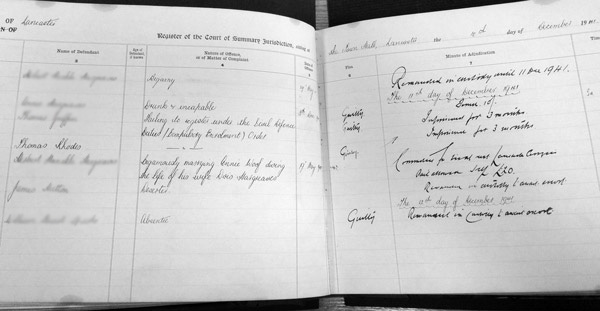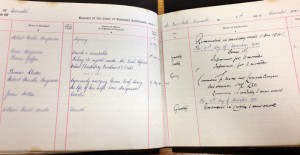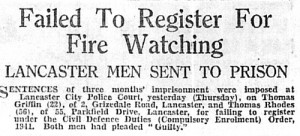
‘I deny the right of any State to conscript any individual for the foul purpose of war’. So said Lancastrian Quaker and Pacifist Advisory Bureau member, Thomas Rhodes, when put on trial in 1941 for refusing to register for compulsory fire-watching service. In this article, Charlotte Taylor examines Rhodes’s principled stand against conscription – a stand that landed him in prison – and looks at the local reaction to it at the time.
The Conscientious Objection of Thomas Rhodes
Posted by Charlotte Taylor, Lancaster Girls’ Grammar School
Lancaster Pacifist Advisory Bureau

Court Record of Thomas Rhodes’s Trial and Sentence in Lancaster, December 1941 (Petty Sessions court records: Lancaster Borough -later City Magistrates Court- Lancashire Archives, Preston)
Thomas Rhodes was a conscientious objector living in Lancaster throughout the Second World War. In 1939 he co-founded the nine-member Lancaster branch of the Pacifist Advisory Bureau. PABs were set up all across the north with similar aims and they ran throughout the Second World War. Their initial purpose was to provide support for conscientious objectors, which included providing financial assistance, arranging jobs, visiting prisons and writing letters on behalf of C.O.s. The Bureau also worked in collaboration with other pacifist groups such as the Peace Pledge Union (PPU) and the Central Board for Conscientious Objectors (CBCO). The group had strong links with the Quaker community, of which Rhodes was an active member, as well as the Independent Labour Party (ILP) – four members of the PAB were founder members of the Lancaster branch of the ILP in 1941. After being told it was advisable to have a woman in the group, Rhodes’s wife, Rose Rhodes, was made secretary and made her own presence known when her husband went up for trial. [1]
I deny the right of any State to conscript any individual for the foul purpose of war… I wish to say this, and I am entitled to say it. The present government has shown by this order and other conscription measures that their aim is to establish a totalitarian state, in which everybody is to be enslaved for the insane and un-Christian purpose of destroying his fellow man. I am opposed to the Government and its war policy, and refuse to recognise its right to compel me to become part of the war organisation.
Rhodes’s Trial for Conscientious Objection in 1941
The aforementioned trial was in 1941 for ‘Failing to register under the Civil Defence Duties (Compulsory Enrolment) Order.’ [2] Rhodes, along with fellow Lancastrian, Thomas Griffin, had refused to register for fire watching service on 14th September 1941 and consequently was put on trial. On 12th November Rhodes wrote to the manager of enrolment denying the right of the state to conscript anyone, a statement repeated on the 8th December when he was summoned to court:
‘I deny the right of any State to conscript any individual for the foul purpose of war… I wish to say this, and I am entitled to say it. The present government has shown by this order and other conscription measures that their aim is to establish a totalitarian state, in which everybody is to be enslaved for the insane and un-Christian purpose of destroying his fellow man. I am opposed to the Government and its war policy, and refuse to recognise its right to compel me to become part of the war organisation’. [3]
Interestingly, Rhodes did not take issue with fire watching per se; it was the fact it was a compulsory duty that he objected to. Bravely, Rhodes stated that any punishment would not alter his views towards the government and have no effect upon his conscientious objection. The punishment in question was three months imprisonment.
We may win this war or we may lose it – and I, for one, believe and pray that we will win it – but there is something much bigger than the war; and we seem to have lost that already. It is the struggle for truth and mercy, for kindness and toleration, and all things that go as ‘goodness’…
Reaction in Lancaster to Rhodes’s Imprisonment
After his trial Rhodes received support from other Lancastrians. However, it was his wife Rose who had most correspondence with local papers concerning her husband’s imprisonment. She wrote: ‘The Lancaster Corporation Emergency Committee has failed in its duty to one of its citizens and I intend to protest by all possible means against this unjustifiable sentence of imprisonment’. [4]
Another member of the local community wrote a letter to the newspaper stating that the Lancaster Court had ‘failed… completely in their understanding of the moral issue’ [5], which in many respects is true. They had failed to understand that Rhodes did not want to be conscripted but would happily volunteer. In light of the way he was treated Rhodes received support in a letter to the newspaper from Kenneth Cohen, who was not himself a CO but knew Rhodes and felt moved to defend him:
‘May I take this opportunity to say that I have never met a more frank, open, honest and sincere man than Thomas Rhodes. The passing of a maximum sentence on a man, a first offender, who is nearing sixty, is base cruelty… I, myself, am not a C.O., but this spirit of intolerance and love of cruelty shown by officialdom towards obviously sincere men convinces me that this war will achieve neither lasting peace and justice, nor democracy, and may yet lead us to adopt the methods of our enemy.
We may win this war or we may lose it – and I, for one, believe and pray that we will win it – but there is something much bigger than the war; and we seem to have lost that already. It is the struggle for truth and mercy, for kindness and toleration, and all things that go as ‘goodness’…. Yes, they can imprison these men or treat them as they will; but it is not the men that county. You cannot imprison the spirit that animates them, the spirit that will suffer all punishment before conceding one atom of principle. That will live on, and be respected when their judges and all that this civilisation stands for are beyond all human memory’. [6]
Rhodes’ story is one of incomparable bravery and nobility.

Local newspaper coverage of Thomas Rhodes’s Trial (Document available in the Thomas Rhodes Collection, Lancashire Archives, Preston)
Response from Fenner Brockway, Chair of the Central Board for Conscientious Objectors
Rhodes also received support from Fenner Brockway, the prominent political activist and pacifist and chair of the Central Board for Conscientious Objectors. In a letter to Rhodes’s son dated 31st December 1941, Charles, Brockway writes, ‘While I consider the sentence was vindictive it was within the law. Herbert Morrison [then Home Secretary, who Brockway had contacted about the case] may take the view that it is not for him to intervene.’ Brockway goes on to say, ‘I came to appreciate the personality of Tom Rhodes tremendously during the recent Lancaster by-election [during which Brockway had stood unsuccessfully as the Independent Labour Party candidate] and feel great sympathy for him and Mrs. Rhodes and you. I am sure however that he will go through this experience smiling and with his chin up’. [7]
The Power of Rhodes’s Story
Rhodes’s story is one of incomparable bravery and nobility. To refuse to let go of his values and go against the state at such a turbulent time is a virtue which none too many could follow. By going against the status quo he could have incurred the wrath of not only the government but of his neighbours and colleagues. Instead a number of them came out in support for both him and his wife. Rhodes kept these records regarding his case in remarkable condition; this gives us an interesting insight into the kind of man Thomas Rhodes was. He clearly felt it was valuable to keep a record of what he saw as an injustice perpetrated by a state which was, as he saw it, denying his civil liberties. While he was imprisoned his morals were not compromised in the slightest and that is undeniably admirable.
- All of the material listed below is available in the Thomas Rhodes Collection [insert hyperlink: http://archivecat.lancashire.gov.uk/CalmView/Record.aspx?src=CalmView.Catalog&id=DDX+2839&pos=1], held at the Lancashire Archives, Preston.
- [1] Information about the formation and history of the Lancaster PAB contained in Lancaster Pacifist Advisory Bureau Letter Book, 1940-45 and Minute Book, 1939-50.
- [2] Order for Thomas Rhodes to appear before the Court of Summary Jurisdiction for failing to register under the Civil Defence Duties (Compulsory Enrolment) Order, September 1941.
- [3] Thomas Rhodes, December 1941. ‘My Objection To Registration For Compulsory Fire-Watching.
- [4] Rose Rhodes, December 1941. Letter to local newspaper.
- [5] Anonymous, January 1942. Letter to local newspaper.
- [6] Kenneth L. Cohen, December 1941. Letter to local newspaper.
- [7] Letter from Fenner Brockway to Charles Rhodes, son of Thomas, regarding his father’s conviction, 31 December 1941.

